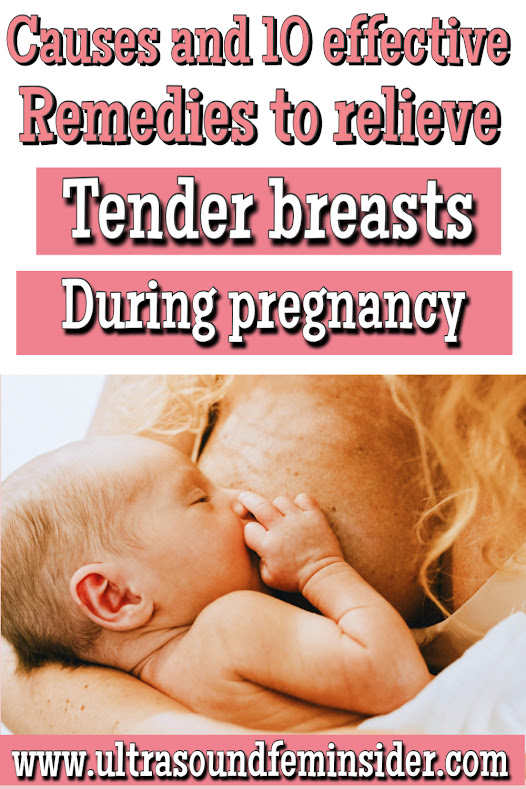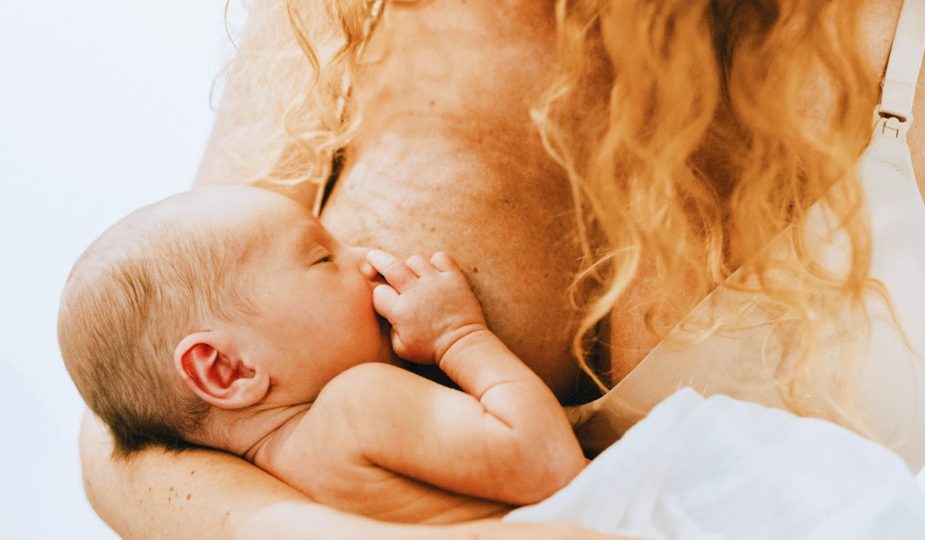One of the most fascinating aspects of pregnancy is how your body begins to prepare right away. Your breasts are changing and perhaps getting more sensitive or uncomfortable, even when it’s too early to take a test and long before the rest of the world can see your bump. In this article we are going to talk about causes and effective remedies for tender breasts during pregnancy. Ready? Let’s begin.
When do your breasts get painful during pregnancy?
One of the first signs of pregnancy for many women is sore and painful breasts. Breast tenderness isn’t a reliable indicator of pregnancy, but it’s one that many women notice.
This is because early in the first trimester, breasts can feel painful or sore. Your breasts will start to feel larger or more sensitive around the six-week mark. Tenderness or tingling, as well as a weird sensation of pins and needles, may be the earliest indicators of breastfeeding preparation.
What causes tenderness in your breasts during pregnancy?
Those hard-working pregnant hormones (estrogen and progesterone) can’t wait to start preparing your breasts for their new job. Even if nursing is still a few months away, your body begins to prepare the moment you conceive your child. Pregnancy hormones kick-start everything in preparation for milk production, stimulating fat storage and milk duct growth, while additional blood flow to the area can enlarge the mammary tissue in preparation for the crucial job ahead.
Your breasts may also begin to feel rough to the touch as they grow larger, this is primarily due to the growth of the internal milk-producing ducts and lobes. You may also notice that your nipples become larger and the pigmented region surrounding them, known as the areola, darkens to assist your newborn baby in finding his way to your milk.
What happens to your breasts as your pregnancy progresses?
During the second trimester, breast growth normally stabilizes after the initial hormonal surge subsides. However, because your breasts can increase by roughly 5 cm in size and 1.4kg in weight during pregnancy, they might still feel heavy and sore.
Before the baby is born, the changes pick up again. Breasts prepare for lactation in the last few weeks, so don’t be surprised if you see a little colostrum (a thick, yellowish milk) at this stage. An increase in blood flow can sometimes result in a map of bluish veins under the skin again, this is a perfectly typical symptom of breast changes and nothing to be concerned about.
It’s simpler to understand why your breasts feel achy or tingly when you examine the numerous complex processes that occur inside them between conception and birth. For some women, breast discomfort is severe, while for others, the changes are scarcely noticeable. Whether it’s constant or comes and goes as your pregnancy continues, it’s usually nothing more than a reassuring indicator that your body is preparing itself for the arrival of your baby.
How long does breast discomfort persist after pregnancy?
Once you’ve fed your baby or your body has calculated how much milk needs to be produced, the pain will go away on its own. Any discomfort you may feel while feeding your baby will subside on its own. However, if the pain persists, you should seek medical advice.
Here you have 9 effective tips to relieve tender breasts during pregnancy:
Tip# 1 Wear a bra that is supportive.
If your breasts are sore, a well-fitted bra will be definitely helpful. Because your breasts will change throughout your pregnancy, a bra that fits good now may not fit well afterwards. Check the fit of your bra if your breasts become uncomfortable again.
Fitting advice is available at high-street stores. You can also check with your local NCT to see if a trained bra-fitter is available in your region.
Sports bras are meant to keep your breasts close to your chest and limit breast mobility. Because movement can aggravate soreness, if you can keep them from bouncing or moving as you move, you may find relief.
Tip# 2 Experiment with a new maternity bra even before you think you need it.
Taking care of your breasts will make them feel more comfortable now and will help them bounce back into form later. There are many different types of maternity bras, but any supportive bra that can handle your growing cup size will be enough. Always look for an adjustable bra with solid support, broad shoulder straps, and room to expand around the chest and cup.
Although it’s common knowledge that you shouldn’t wear wired bras while pregnant, there’s no evidence to back up allegations that they can cause milk duct blockage. The most crucial thing is that your bra is comfortable to wear.
Tip# 3 Consider using Bras for sleeping.
Tender breasts can be especially bothersome at night, so a non-wired bra may help you sleep better. Sleeping in a bra reduces movement and reduces the risk of fragile nipples being hurt by bedding or nightwear. There are sleep bras available, but keep in mind that lace or synthetic materials might irritate sensitive skin, and conspicuous seams can chafe. The best bra for you is a soft cotton bra that supports your growing breasts.
Sharing is caring.

Tip# 4 Keep touch to a minimum.
If your breasts hurt, you’re probably already attempting to keep your nipples from coming into contact with anything unnecessary. Your clothes, seat belts, and cross-body bags may hurt your nipples even more. If you’re irritated, try switching to softer fabrics, adjusting seat belts, or switching to a different bra style etc.
Tip# 5 Talk about sex
When it comes to sex be honest and frank with your partner about how you feel about having your breasts touched during sex. Your spouse will not intentionally injure you, but they may not notice it, therefore you must tell them how you are feeling to avoid being in pain.
Tip# 6 Use breast pads if possible.
Breast pads are undoubtedly recognizable to you if you’ve already nursed before. Breast pads are often constructed of soft, washable cloth that can be reused to protect the nipple. Soothing or cooling gels are also included in some breast pads.
Tip# 7 Calm down.
A warm flannel wrapped around your breasts can provide immediate relief. Warm compresses can help to improve circulation, reducing swelling and soreness. If you prefer a cooling sensation, consider using a cold compress or cleaning cabbage leaves and chilling them before putting them in your bra.
Tip# 8 Drink plenty of water.
Staying hydrated and drinking the recommended amount of water has numerous benefits for the body. Water retention can aggravate sore breasts, so drink plenty of water throughout the day. During pregnancy is recommended 6-8 glasses of water each day.
Tip# 9 Self-massage your Breasts.
Self-massage of the breasts can assist to reduce inflammation and increase blood flow. This will aid in the maintenance of healthy breast tissues and ensure that more nutrients reach the breasts, reducing pain and soreness.
- Soap your breasts in the shower and then gently massage them from the middle of your chest to your armpits for a few minutes. If you’re breastfeeding, avoid putting soap on your nipples.
- Alternatively, mix a few drops of camphor oil with 2 tablespoons warm olive oil and massage your breasts once or twice a day.
- Another approach is to blend equal parts apricot and wheat germ oil and apply it as a massage oil to your delicate breasts.
- Regularly massage your breasts to maintain them healthy and pain-free.
Tip# 10 Prioritize Food and vitamins that relief tenderness in your breasts.
Vitamin E is very helpful in treating breast pain. It helps regulate hormonal changes in the body, which in turn reduces breast pain.
- A daily dose of 200 to 400 IUs of vitamin E can prevent breast pain and tenderness during menstruation. Consult your doctor for the correct dosage.
- Eat foods rich in vitamin E, such as sunflower seeds, almonds, olive oil, spinach, avocados, turnips, beet greens and mustard greens.
- You can also use vitamin E oil to massage your breasts gently a few times a day.
Magnesium is an important daily nutrient that can help alleviate breast issues like tenderness and pain during menstruation or pregnancy as well. Magnesium helps reduce fluid retention, which reduces pain and swelling in the breasts.
- Eat foods rich in magnesium like dark leafy greens, nuts, seeds, soybeans, avocados, bananas and dark chocolate.
- Make sure that your prenatal supplement has magnesium. For proper dosage always consult your doctor.
- Limit your intake of caffeine as it can cause soreness and tenderness in the breasts.
- Eat plenty of fiber to help your body flush out extra estrogen. You can get fiber from cabbage, broccoli, kale, sprouts, legumes and whole grains.
- Reduce your intake of hydrogenated oils, found in margarine, packaged baked goods and snack products.
- Reduce fat in your diet and eat more vegetables and fruits that are high in antioxidants to help the body fight off free radicals.
Next, read other popular articles in our site.
Tips to prepare for a healthy pregnancy.
How to Naturally Prevent Pregnancy Depression.
Foods To Avoid During Pregnancy.
Tips to prevent and cure mastitis.
Final thoughts about Tender breasts during pregnancy. Causes and remedies.
There are many changes that happen to breasts during pregnancy, and one of them is breast tenderness. All of these changes are normal, so there’s no need to be alarmed unless you see something unusual, like bleeding from your nipples, which is not normal under any circumstances. If that’s the case, you should get help from a doctor. As for the other changes, don’t worry about them. They are part of the natural process every woman goes through after she gets pregnant.
Zadi, xo
Disclaimer: The medical information on this post is for educational and entertainment use only. Under no circumstances, this information is to replace your doctor’s advice or to treat any disease. For proper care, always visit your doctor.










[…] Tender breasts during pregnancy. Causes and remedies. […]
[…] Tender breasts during pregnancy. Causes and remedies. […]